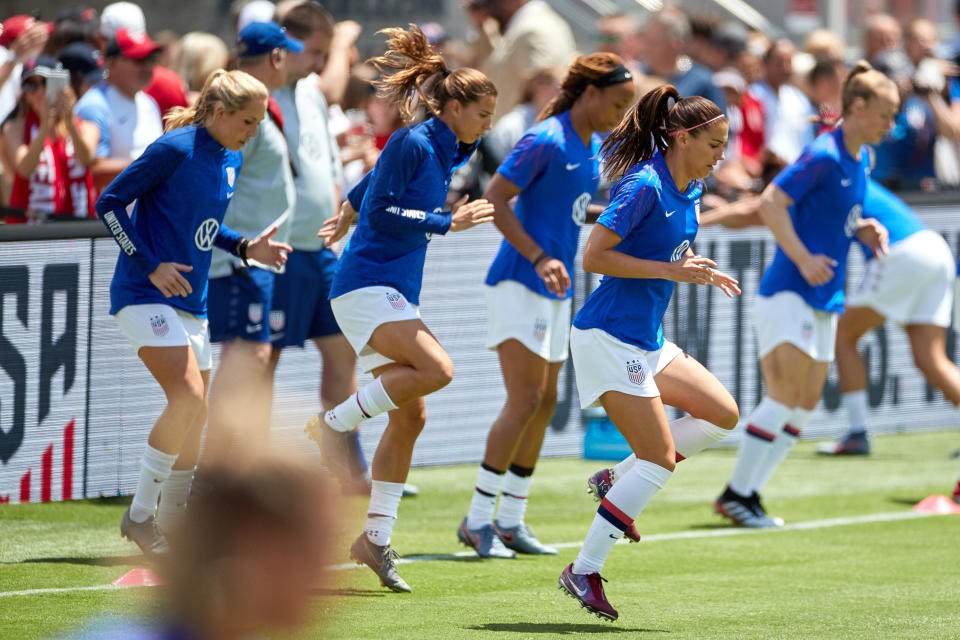USWNT knows winning the World Cup again could help score an even bigger victory in equal pay fight

So about the elephant in the room. About that massive story, just kind of sitting there in plain sight, yet also going largely unacknowledged and unaddressed. About that equal pay fight the United States women’s national team is locked into with the U.S. Soccer Federation, while the former is about to represent the latter in France in its title defense at the Women’s World Cup.
About all of that.
The women’s national team’s lawsuit against U.S. Soccer, filed on March 8, is ongoing. On May 6, the federation filed its answers and affirmative responses. And in the meantime, new-ish U.S. Soccer president Carlos Cordeiro has been trying to soften the ground for a compromise.
The standoff has gone on for several years, with the players demanding as much money as the senior men’s national team gets, while U.S. Soccer maintains that different pay structures and collective bargaining agreements make apples-to-apples comparisons impossible. But now the federation and its female stars will work together to claim a fourth World Cup title.
How to do that? When the tension from the case and the years of preceding negotiations and legal maneuvering has at times run quite high?
“It’s kind of on the backburner right now,” co-captain Carli Lloyd said. “We did what we needed to do and now need to just go focus on winning and take care of that later.”
That seems to be the consensus among the team.
And head coach Jill Ellis says the case hasn’t been an issue, and indeed never got to the level of being a point of contention between the players and the federation staffers they work with every day. “I’m really fortunate to have an incredibly professional group of women,” said Ellis. “The players understand that we support them and have their backs on and off the field and that we have to be this way.”
Yet Ellis sympathizes with the players’ cause. “I understand,” she said. “I’m a woman. I have a young daughter. I understand a lot of the bigger social issues out there. But I also understand right now the job is to get the team focused – and they are focused – only on one thing and that’s this tournament.”

But if the team has essentially paused its legal battle for the duration of the World Cup, it remains committed to the ideas behind the case – which they argue is as much about money as what that money represents. “It’s about knowing your value and knowing your worth and what you deserve,” said backup goalkeeper Ashlyn Harris. “And we deserve more and we will keep pushing and fighting for that and not stray away from what is at hand.”
There’s a practical piece to the equation as well. “The realization is I’m 33 years old and this is my last World Cup,” Harris said. “I need to start figuring out what I’m gonna do next so I can pay my mortgage and my bills and all these different things. And my male counterpart would never have to have that worry. I’ve dedicated my entire life to my craft. I’ve given up everything. My family, my relationships have come second, and I have not been financially rewarded for what I’ve given and the success I’ve reached. So why do we speak up? Because I don’t want the future [female players] to have to worry about what I have to worry about in a few years, and that’s starting this life all over again at 35.”
Midfielder Rose Lavelle, for her part, thinks the national team has a responsibility to the women’s game in the United States as a whole. Because for non-national teamers in the National Women’s Soccer League, a circuit bankrolled largely by the federation in order to provide consistent competition for its elite players, the salaries are barely livable.
“I think the next step is that we need sustainable income so that people can feel this is their full-time job,” Lavelle said. “The reality right now of women’s sport in general is that they can’t devote their whole life to what they love. That should be the next step. We need to make everyone feel like they’re a professional athlete.”
Yet all of those concerns, all of those objectives and motivations, have been set aside for now. Because if the national team flames out in France, it will cloud its campaign for pay equality. The women would like to keep making their argument from a position of strength. “This team is about winning,” said Harris. “Win, win, win, win, win. We win it all. And that’s why we can sit here and have a platform and continue to push for equality, because we are winners.”
And to win the larger battle, it would be helpful to first win the World Cup. The rest, as the women’s national team sees it, will come later.
Leander Schaerlaeckens is a Yahoo Sports soccer columnist and a sports communication lecturer at Marist College. Follow him on Twitter @LeanderAlphabet.
More from Yahoo Sports:
Alexandria Ocasio-Cortez responds to ‘hateful’ baseball team video
Jack Nicklaus thinks Tiger Woods is back on track for 18 majors



